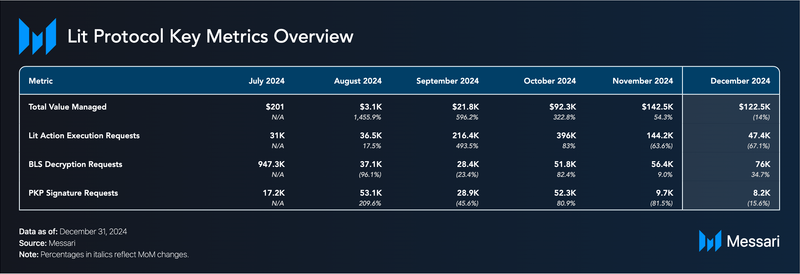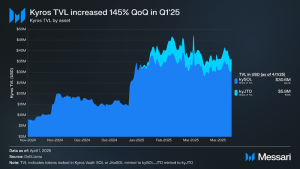Key Insights
- In Q4 2024, Lit Protocol introduced the Lit SDK v7, Lit Event Listener, and Lit Agent Wallet.
- Lit Action execution requests increased to 587,500 in Q4, representing 107% quarter-over-quarter (QoQ) growth.
- In Q4, there were 70,100 Programmable Key Pairs (PKPs) signature requests, a 29.3% QoQ decrease.
- By the end of December 2024, the total value managed (TVM) in PKPs and Wrapped Keys was $122,500, a 461.1% QoQ increase. Solana led the TVM distribution with 59.6%, followed by Ethereum with 15.3% and Base with 8.5%.
- Genius Terminal, VaultLayer, OrbisDB, Bonny, Crossmint, and others integrated Lit Protocol’s infrastructure.
Primer
Lit Protocol is a decentralized key management and computing network designed to facilitate secure signing, encryption, and compute operations. By leveraging advanced cryptography, sealed confidential hardware, and peer-to-peer networking, Lit enables developers to securely generate and manage non-custodial keys, implement private computations, and create adaptable access control mechanisms. Lit’s decentralized network fosters a range of applications, such as autonomous agents, chain abstraction, and Wallet-as-a-Service, by offering three core services:
- Signing: Lit enables secure, programmable signing using threshold cryptography with Programmable Key Pairs (PKPs) and Wrapped Keys (WKs).
- Encryption: Lit allows developers to encrypt data with identity-based encryption and custom access control conditions, ensuring only authorized users can decrypt private data.
- Compute: Lit supports private computation through Lit Actions—JavaScript programs that control Lit Key signing and decryption, executed offchain within each Lit node’s Trusted Execution Environment (TEE).
The Lit network consists of a collection of sealed Lit Nodes. Each node performs cryptographic operations in parallel with other nodes. The network requires nodes to achieve a two-thirds consensus to sign or decrypt, which ensures security and privacy. Lit’s distributed key generation (DKG) model ensures that no single node holds complete key access. Currently, Lit Protocol’s Datil Mainnet Beta is live on the Chronicle Yellowstone blockchain. Lit Protocol raised over $15 million in investments from 1kx, Collab+Currency, Sfermion, and more. For a complete primer on Lit Protocol, refer to our Initiation of Coverage report.
Website / X (Twitter) / Discord / Telegram
Key Metrics
Performance Analysis
Network Activity
As of February 3, 2025, there were ~1.27 million total keys and ~345,000 PKP addresses on mainnets and testnets. Live metrics are available via Lit Protocol’s mainnet dashboard and testnet dashboard.
Lit Actions

Lit Actions are immutable JavaScript programs that run on a decentralized Lit network. In Q4 2024, there were 587,500 Lit Action execution requests across all of Lit Protocol’s networks, a 107% quarter-over-quarter (QoQ) Increase from Q3 to Q4.
BLS Decryptions

Lit’s encryption and decryption algorithm utilizes Boneh-Lynn-Shacham (BLS) signatures. In Q4 2024, there were 184,200 BLS decryption requests across all of Lit Protocol’s networks, an 81.8% QoQ decrease from Q3 to Q4.
PKP Signatures

Programmable Key Pairs (PKPs) are ECDSA public/private key pairs created by the Lit network using Distributed Key Generation (DKG). In Q4 2024, there were 70,100 PKP signature requests across all of Lit Protocol’s networks, a 29.3% QoQ decrease from Q3 to Q4.
Total Value Managed

By the end of December 2024, the total value managed (TVM) in PKPs and Wrapped Keys, excluding NFTs, was $122,500, a 461.1% QoQ increase from the end of Q3 to Q4. Solana led the TVM distribution with 59.6%, followed by:
- Ethereum: 15.3%
- Base: 8.5%
- Optimism: 6.3%
- Avalanche C: 3.2%
- Arbitrum: 2.7%
- BNB: 2.4%
- Polygon: 2.1%
On September 23, 2024, the network officially launched PKP signing, enabling integration partners to begin implementation. This launch significantly increased TVM.
Qualitative Analysis
Upgrades and Roadmap
In Q4 2024, Lit Protocol introduced several technological advancements to enhance its decentralized key management network.
Lit SDK v7
In November 2024, Lit Protocol launched the Lit SDK v7, introducing enhanced encryption functions and significant enhancements to the developer experience. These improvements streamline Lit integration and boost overall efficiency.
Lit Event Listener
On Dec. 24, 2024, Lit Protocol released the Lit Event Listener, a TypeScript library that enables developers to create automated workflows by monitoring both onchain and offchain events. Key features include listeners for EVM-compatible networks, smart contract events, timers, and offchain HTTP endpoints, as well as a flexible state machine for defining states and transitions. The Lit Event Listener facilitates full automation by enabling events and triggers to execute Lit keys (PKPs and Wrapped Keys) and Lit Actions without manual intervention. This supports a range of use cases, including cross-chain operations through chain signatures.
Lit Agent Wallet
On Dec. 25, 2024, Lit Protocol introduced Lit Agent Wallet, a secure execution framework that enables decentralized agents to autonomously perform approved actions, such as onchain transactions, on behalf of users without adding new trust assumptions. By leveraging Lit Protocol’s distributed key management, the Agent Wallet enhances automation while maintaining security through configurable onchain policies. This framework empowers AI-driven agents to interact with blockchain infrastructure seamlessly, enabling use cases like automated trading, smart contract execution, and DAO governance.
Roadmap
Lit’s mainnet, V1, is scheduled to be released in Q1 2025. The V1 network will introduce additional performance improvements, a new payment model, and the Lit Protocol token (LITKEY).
Lit Protocol also plans to expand the range of supported cryptographic keys:
- ECDSA Keys
- Supported Curves:
- Use Cases:
- Transport Layer Security (TLS) certificate signing
- A “Login with Google” feature can leverage LIT’s P-256 passkeys
- Schnorr/EdDSA (FROST) Signatures for PKPs
- Fully Homomorphic Encryption (FHE) Keys
- Threshold Decryption: Implement joint decryption across multiple parties, reducing single points of failure
- Exportable MPC Keys: Extend the power of Multi-Party Computation (MPC) by exporting keys for further use
Ecosystem Projects
As of December 2024, more than 70 known projects and potentially hundreds more were built using Lit. These projects span multiple verticals, including Developer Tooling, Data Marketplaces, Identity, Digital Product NFTs, and User Wallets.
Integrations
Genius Terminal
On Oct. 1, 2024, Genius Terminal launched its beta version, providing a decentralized, non-custodial token management platform built on Lit Protocol. By leveraging Lit’s MPC and Programmable Key Pairs (PKP) infrastructure, Genius securely shards users’ keys across nodes, ensuring only account holders can access their funds. On Oct. 24, it released Genius Bridge Protocol (GBP), a modular cross-chain intent bridge that enables seamless, non-custodial trading without traditional rebalancing infrastructure. GBP abstracts gas, addresses, and transaction signing into a single click while leveraging decentralized orchestrators and native DEX liquidity for low-fee swaps across multiple networks.
VaultLayer
On Oct. 7, 2024, VaultLayer released the beta version of its chain-abstraction SDK for Bitcoin DeFi. VaultLayer leverages Lit Protocol’s threshold key management network to create an offchain Bitcoin smart account. On Nov. 11, VaultLayer launched Bitcoin Liquid Staking Vaults (LSVs) on testnet. LSVs are derivative assets representing native Bitcoin staking and can be used as collateral in existing and emerging DeFi markets.
OrbisDB
OrbisDB, a decentralized database for Web3 applications, integrated Lit Protocol to enable encrypted, permissioned data storage. By leveraging Lit’s PKPs and Access Control Conditions, OrbisDB allows developers to encrypt data and define precise access rules onchain and offchain. This integration supports use cases requiring controlled data access, such as private messaging and restricted content sharing, while maintaining decentralized storage.
Bonny
On Oct. 14, 2024, Bonny integrated Lit Protocol to enhance encryption and access control. By integrating Lit Protocol, OrbisDB, and Ceramic Network, Bonny ensures user data is securely managed and accessible only with user consent. Bonny uses Lit Protocol to encrypt and control access to anonymized spending data, which users can share in exchange for crypto rewards. This integration provides a structured approach to managing and securing user-contributed data.
Crossmint
On Dec. 4, 2024, Crossmint released GOAT (Great Onchain Agent Toolkit), an open-source framework for integrating AI agents with onchain applications. GOAT provides a unified library of 200+ onchain actions compatible with 6+ agent frameworks, 2+ programming languages, and any wallet architecture across 30+ chains. Developers can integrate Lit Protocol keys to enable autonomous agent functionality.
Hackathons and Events
During Q4 2024, Lit Protocol actively participated in various hackathons:
ETHGlobal San Francisco
ETHGlobal hosted ETHGlobal San Francisco, a hackathon held from Oct. 18 to 20. Lit Protocol awarded $9,500 in prizes to projects that showcased the best DeFi application powered by Chronicle and the most innovative Chronicle integration. The winning projects included Qiao, Intellijack, Socialfly, Lit Data Market, DMNO, BAM Protocol, DeepTrust.eth, and Earnify.
ETHIndia Hackathon
Devfolio hosted the ETHIndia Hackathon in Bengaluru, India, from Dec. 6 to 8. Lit Protocol awarded $5,000 in prizes to projects that demonstrated the most innovative and advanced implementation of Lit, focusing on onchain composable autonomous AI agents. The winning projects included SupraNova, AI-Avatar, w8s, Chote Rajan, Instaclaim, and Khoj.
Gaia Autonomous Hackathon
Gaia hosted the Gaia Autonomous Hackathon, a virtual event held from Dec. 9 to 13, fully organized, moderated, and judged by AI agents. The judging was led by VITAL-AI-IK, an AI agent built with Lit Protocol and Gaia, which users could fork to create their own agents.
Send Solana AI Hackathon
The Solana AI Hackathon was a global online event held from Dec. 10 to 23, centered on building AI agents and tooling on Solana. Powered by Send AI and supported by teams in the Solana ecosystem, the hackathon featured over $275,000 in prizes, with awards ranging from $5,000 to $30,000 for projects developing Crypto x AI applications. Lit Protocol, Arcium, and Dain sponsored the Agents Infra track, awarding $27,500 in prizes to projects that built infrastructure and frameworks for AI agents on Solana, including tools like Proof of Sentience and workflow automation. The winning projects were AgentiPy, Neur, and ZkAGI.
Closing Summary
In Q4 2024, Lit Protocol introduced several new technical tools, including Lit SDK v7, Lit Event Listener, and Lit Agent Wallet. During this quarter, Lit Action execution requests increased by 107% compared to Q3, while PKP signature requests and BLS decryption requests declined. The total value managed in PKPs and WKs reached $122,500, with Solana accounting for 59.6% of the distribution. Lit Protocol’s infrastructure was integrated by multiple partners, such as Genius Terminal, VaultLayer, OrbisDB, Bonny, and Crossmint. Additionally, the protocol was active in various hackathons, including ETHGlobal San Francisco, ETHIndia, Gaia Autonomous, and Send Solana AI Hackathon. The upcoming Lit V1 network, scheduled for release in Q1 2025, is expected to introduce further performance improvements, a new payment model, the live LITKEY token, and an expanded range of supported cryptographic signing algorithms.





















